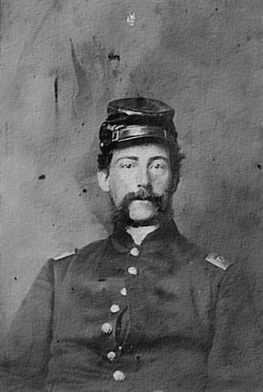
 |
||
 |
John S. H. Doty 11th Illinois Volunteer Infantry 104th Illinois Volunteer Infantry |
 |
 |
||
 |
||
|
Captain John S. H. Doty was born to parents Henry A. Doty Sr. and Elizabeth Livenger in Carlisle, Cumberland County, Pennsylvania on April 16, 1839. The family moved to Ohio and later to Illinois. He was a carpenter working with his father, Henry A. Doty, before volunteering to join first, the 11th Illinois Infantry (3 months), and finally the 104th Illinois Infantry. He was commander of Company E of the Illinois 104th until he was killed in battle on July 20, 1864 in the Battle of Peach Tree Creek, Georgia. His regimental commander, Lt. Col. Douglas Hapeman, who won the Congressional Medal of Honor during this battle on the day Doty was killed, praised Doty's bravery and mentioned, "The loss of Captain Doty, Captain Rnearson, and Captain Fitzsimmons is deeply felt by the regiment. They were gallant officers, and loved and respected by their men." ("The War of Rebellion-Official Records of Union and Confederate Armies", Series I, Vol 38, Part 1, Atlanta Campaign). Captain John S. H. Doty is buried in the Ottawa Avenue Cemetery in Ottawa, Illinois. He was 25 years, 3 months and 5 days old. His tombstone contains the quote, "Tell Father I died a Patriot and a Christian. Good bye Boys", perhaps some of his last words. His older brother, Henry A. Doty, served as First Sergeant of Company E until both were captured by Confederates in the Battle of Hartsville, Tennessee. Both were paroled and Henry became seriously ill and received a medical discharge. John continued as company commander until his death having participated in many battles with The Army of the Cumberland including: Chickamauga, Rossville Gap, siege of Chattanooga, Lookout Mountain, Mission Ridge, Resaca, Kennesaw Mountain and a number of other battles between Brentwood, Tennessee and Atlanta, Georgia. |
Submitted by Charles H. Bartlow, John S. H. Doty is his Great Grand Uncle.
For corrections or additions, please contact Special Project Coordinator:
Kimberly Morgan
Last Edited: 12 Mar 2025